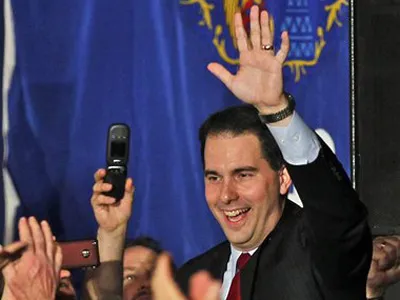What lesson will elected officials in other states learn from Wisconsin’s recall showdown?

Wisconsin Vote Shows Unions Losing Strength
Wisconsin Gov. Scott Walker’s victory deals blow to unions

By ousting Scott Walker from office less than a year-and-a-half into his term, Big Labor hoped to send a message to elected officials nationwide that it's too dangerous to try to roll back government union bosses' monopoly privileges, however harmful they are to taxpayers and independent-minded employees.
As Americans who follow political news (ardently, casually, or somewhere in between) surely already know, on Tuesday Wisconsin GOP Gov. Scott Walker handily defeated union bosses’ multimillion-dollar bid to wreak vengeance on him by ousting him from office less than a year-and-a-half into his term. In a special “recall†election Big Labor engineered by launching a petition drive in 2011, Mr. Walker defeated his union-label Democrat challenger, Milwaukee Mayor Tom Barrett, 53% to 46%.
Along with Mr. Walker, the union hierarchy was seeking revenge this week on four other GOP elected officials in the Badger State, including Lt. Gov. Rebecca Kleefisch and three state senators. In her race, Ms. Kleefisch defeated Democrat Mahlon Mitchell, a firefighters union chieftain, 53% to 47%. Two of the three GOP senators targeted by the union brass also survived. The single state Senate gained by forced-unionism proponents did suffice to switch over partisan control of the chamber from Republican to Democrat, at least until this November, when half the seats will once again be up for grabs.
Last year, the Walker Administration infuriated union officials when it successfully sponsored a measure (now known as Act 10) abolishing forced union dues for teachers and many other public employees and also sharply limiting the scope of government union monopoly bargaining. All the senators whom Big Labor sought to recall this year voted for Act 10.
In addition to making examples out of Mr. Walker and his allies, government union chiefs’ indisputable goal in the June 5 recall elections was to restore all of their forced-dues and monopoly-bargaining privileges. Private-sector union bigwigs lent their wholehearted support to the effort, despite the fact that Act 10 does not directly affect them. They undoubtedly acted out of the belief that, the more forced dues that are exacted from workers, the better, regardless of which unions are doing the exacting.
Now that Big Labor has lost, union spokesmen are trying to claim their defeat does not mean Wisconsin voters support Act 10’s repeal of forced union dues for most public employees or its rollback of most government union bosses’ monopoly-bargaining privileges. However, as savvy columnist Michael Barone has reported to his readers (see the first link above) a pre-election Marquette University poll that accurately predicted Mr. Walker’s margin of victory also showed a 55% to 41% majority of likely voters in favor of “limiting collective bargaining for public employees.â€
What are the implications of union political operatives’ near-total defeat in Wisconsin this week? As Mr. Barone explains, the results show that the case that laws handing monopoly control over public employment to union bigwigs result in higher taxes and less efficient and effective public services “can be not only defended but advanced, in a state with a long progressive tradition, which has not voted Republican for president since 1984.†Wisconsin voters are also manifestly receptive to the idea that forced union dues and fees unjustly curtail the freedom of public employees who wish to remain union-free. These are lessons, as Mr. Barone puts it, that could be “taken to heart by governors” and legislators in other states.
Of course, the union bosses hope elected officials in other states draw a different lesson from the recall battle. Democratic strategist and former AFL-CIO Steve Rosenthal summarized their perspective for two Washington Post reporters (see the second link above). Mr. Rosenthal “predicted that other governors would not want to go through what [Mr.] Walker has experienced in the past 18 months and as a result would tread more lightly in attempting to roll back†government union bosses’ special privileges.
Right to Work supporters in Wisconsin and nationwide won a significant victory this week. But they have a tough job ahead of them to mobilize more and more citizens to persuade their elected officials that it is in their best interest to emulate Mr. Walker (indeed, to be bolder still) rather than be cowed by Big Labor’s massive, but ultimately unsuccessful, effort to retaliate against him for what he has accomplished.

